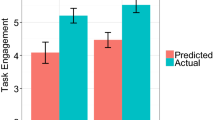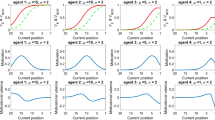Abstract
The present study examined how rewards affect people’s intrinsic motivation when the rewards are tied to meeting increasingly demanding performance standards. The experiment was a 2 x 2 factorial design with 2 levels of performance standard (constant, progressive) and 2 levels of reward (reward, no reward). Using a puzzle-solving task, 60 undergraduate university students were randomly assigned to the experimental conditions. In the constant conditions, participants were required to solve 3 puzzle problems on each of 3 trials; in the progressive conditions, participants were asked to solve 1, 3, and 5 problems over the trials. Half the participants were offered and given $1.00 for each correct solution; those in the no-reward condition were not offered pay. The major finding was that participants in the progressive reward condition spent more time on the task in a free-choice session than those in the other conditions. The findings are discussed in terms of different theoretical accounts of rewards and intrinsic motivation and are most consistent with an extension of Eisenberger’s (1992) theory of learned industriousness.
Similar content being viewed by others
References
BANDURA, A. (1986). Social foundations of thought & action: A social cognitive theory. Englewood Cliffs, NJ: Prentice Hall.
BANDURA, A. (1997). Self-efficacy: The exercise of control. New York: W. H. Freeman and Company.
CAMERON, J., BANKO, K. M., & PIERCE, W. D. (2001). Pervasive negative effects of rewards on intrinsic motivation: The myth continues. The Behavior Analyst, 24, 1–44.
CAMERON, J., & PIERCE, W. D. (1994). Reinforcement, reward and intrinsic motivation: A meta-analysis. Review of Educational Research, 64, 363–423.
CAMERON, J., & PIERCE, W. D. (2002). Rewards and intrinsic motivation: Resolving the controversy. Westport, CT: Bergin & Garvey.
DECI, E. L., KOESTNER, R., & RYAN, R. M. (1999). A meta-analytic review of experiments examining the effects of extrinsic rewards on intrinsic motivation. Psychological Bulletin, 125, 627–668.
EISENBERGER, R. (1992). Learned industriousness. Psychological Review, 99, 248–267.
EISENBERGER, R., & CAMERON, J. (1996). The detrimental effects of reward: Myth or reality? American Psychologist, 51, 1153–1166.
EISENBERGER, R., PIERCE, W. D., & CAMERON, J. (1999). Effects of reward on intrinsic motivation — Negative, neutral, and positive: Comment on Deci, Koestner, and Ryan (1999). Psychological Bulletin, 125, 677–691.
EISENBERGER, R., RHOADES, L., & CAMERON, J. (1999). Does pay for performance increase or decrease self-determination and intrinsic motivation? Journal of Personality and Social Psychology, 77, 1026–1040.
FLORA, S. R., & FLORA, D. B. (1999). Effects of extrinsic reinforcement for reading during childhood on reported reading habits of college students. The Psychological Record, 49, 3–14.
HARACKIEWICZ, J. M., MANDERLINK, G., & SANSONE, C. (1984). Rewarding pinball wizardry: effects of evaluation and cue value on intrinsic interest. Journal of Personality and Social Psychology, 47, 287–300.
HARACKIEWICZ, J. M., & SANSONE, C. (2000). Rewarding comptence: The importance of goals in the study of intrinsic motivation. In C. Sansone & J. M. Harackiewicz (Eds.), Intrinsic and extrinsic motivation: The search for optimal motivation and performance (pp. 79–103). San Diego, CA: Academic Press.
LEPPER, M. R., GREENE, D., & NISBETT, R. E. (1973). Undermining children’s intrinsic interest with extrinsic reward: A test of the “overjustification” hypothesis. Journal of Personality and Social Psychology, 28, 129–137.
LEPPER, M. R., KEAVNEY, M., & DRAKE, M. (1996). Intrinsic motivation and extrinsic rewards: A commentary on Cameron and Pierce’s meta-analysis. Review of Educational Research, 66, 5–32.
OSGOOD, C. E., SUCI, G. I., & TANNENBAUM, P. H. (1957). The measurement of meaning. Urbana, IL: University of Illinois Press.
SCHUNK, D. H. (1983). Reward contingencies and the development of children’s skills and self-efficacy. Journal of Educational Psychology, 75, 511–518.
SCHUNK, D. H. (1984). Enhancing self-efficacy and achievement through rewards and goals: Motivational and informational effects. Journal of Educational Research, 78, 29–34.
SYMBALUK, D., HETH, C. D., CAMERON, J., & PIERCE, W. D. (1997). Social modeling, monetary incentives, and pain endurance: The roles of self-efficacy and pain perceptions. Personality and Social Psychology Bulletin, 23, 258–269.
Author information
Authors and Affiliations
Corresponding author
Additional information
This research was funded by a grant from the Social Sciences and Humanities Research Council (SSHRC) Canada.
Rights and permissions
About this article
Cite this article
Pierce, W.D., Cameron, J., Banko, K.M. et al. Positive Effects of Rewards and Performance Standards on Intrinsic Motivation. Psychol Rec 53, 561–578 (2003). https://doi.org/10.1007/BF03395453
Published:
Issue Date:
DOI: https://doi.org/10.1007/BF03395453




